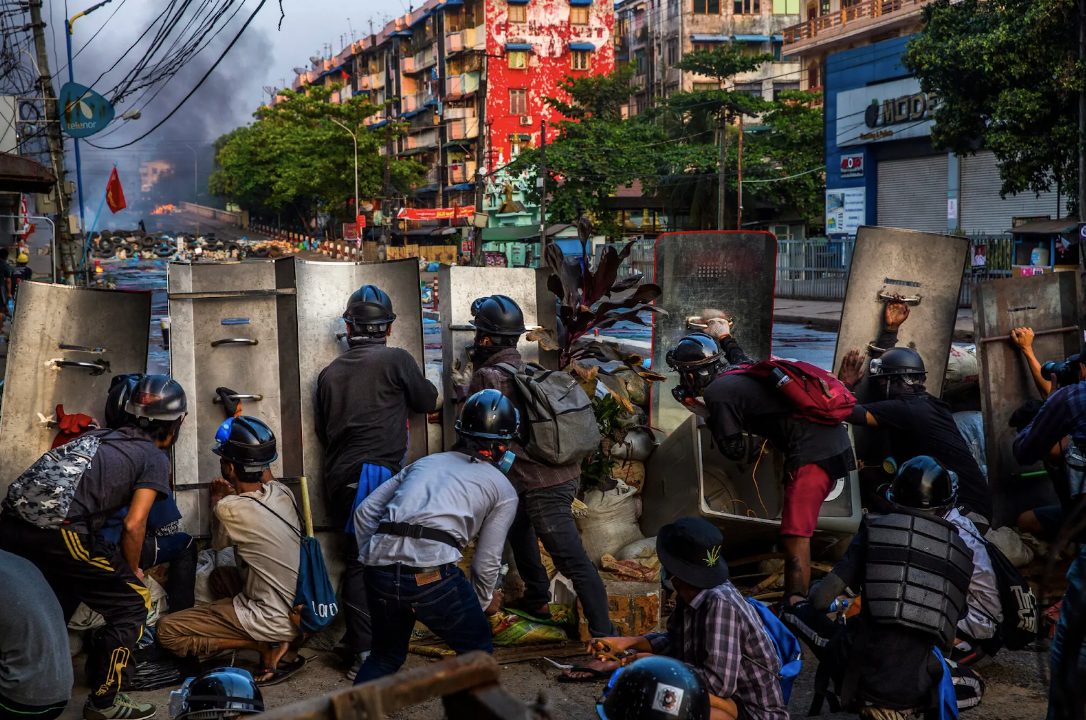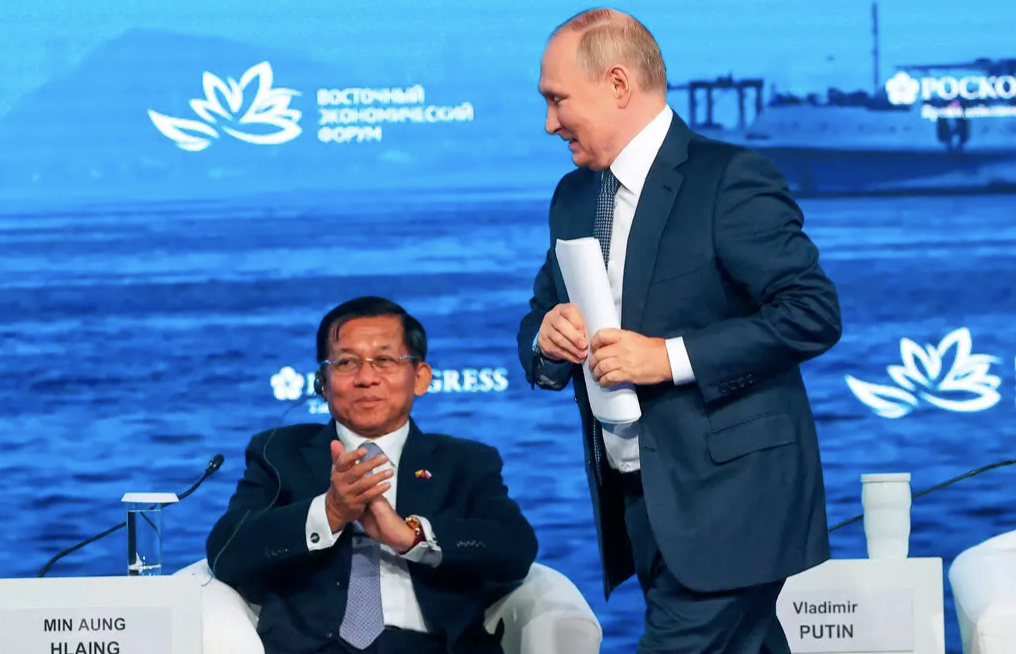Is There Any Hope for Myanmar's Democracy? [Op-Ed]
Protestors march in Myanmar opposing the 2021 military coup. Photo: Getty Images
Seven years ago, things looked good for Myanmar.
Aung San Suu Kyi, the famed Nobel laureate who had been placed under house arrest for most of the last three decades, had just won a landslide victory in the country’s first openly contested elections in 15 years.
She was installed as the state counsellor, and her party, the National League of Democracy (NLD), vouched to undo decades of authoritarian rule under the military. Myanmar seemed like another success story of a country casting off its authoritarian history and moving towards a democratic future.
The same cannot be said today.
Aung San Suu Kyi herself has since fallen from grace, partly because of her inaction against the massacre of the Muslim Rohingya minority. Since the 1970s, the country has had discriminatory policies against non-Burmese minority groups; and since the violence resurged in 2017 in Rakhine state, hundreds of thousands of Rohingya refugees have fled the violence, most to neighbouring Bangladesh where they have formed the largest refugee camp in the world.
Despite this, the NLD remained popular, sweeping the 2020 elections with an even larger margin than in 2015, and were poised to retain power in the country for several years, until the military, known as the Tatmadaw, launched a coup in February 2021. They detained and charged Aung San Suu Kyi with several crimes, including breaching coronavirus rules.
After the coup, hundreds of thousands of citizens gathered in the country’s capital, Yangon, for a non-violent protest. However, the military responded with violence, gunning down demonstrators in the street and cracking down on civil unrest. As of June this year, the junta has since been responsible for the deaths of more than 2,000 civilians.
Protestors in Yangon, Mar. 2021. Photo: New York Times
After decades of resistance, the 2021 coup has seemed to undo all of Myanmar’s progress towards democracy. Was that effort all in vain? Or is there still hope for democracy to flourish in this troubled country?
While Myanmar began as a parliamentary democracy after gaining independence from Britain in 1948, it was quickly replaced by a military coup in 1962. Seen as the force responsible for overthrowing colonial oppression, the military received popular support in post-independent Myanmar and has enjoyed virtually unchecked power since. These decades of authoritarian rule eroded the country’s institutions, making it difficult for democracy to establish itself.
A legacy of oppression in Myanmar, however, comes with a legacy of resistance. Although the hope for democracy seems to be currently snuffed, pro-democracy activists continue to fight the junta. Myanmar has effectively been in a state of ethnic conflict since its independence in 1948. The military action forced minority groups to take up arms in resistance, and much of Myanmar’s countryside was - and continues to be - administered by armed ethnic groups such as the Shan and the Kachin.
In response to the conflict, the National Unity Government of Myanmar (NUG) was created in 2021. It claims to be the legitimate government in Myanmar. With a common enemy of the Tatmadaw, ethnic armed groups have begun discussions with the NUG under the National Unity Consultative Council (NUCC).
While an alliance could be a powerful force against the junta, its stability cannot be ensured if the NUG cannot address ethnic groups’ concerns. However, armed conflict with the Tatmadaw has been going on for decades, and there is no reason to believe that that may end any time soon.
If the impetus is unlikely to come from within the country, then, what of the international community? The Association of Southeast Asian Nations (ASEAN), held a high-level summit on 24 April 2021 to discuss the crisis in Myanmar. The country was represented by the junta leader, General Min Aung Hlaing.
During the summit, ASEAN leaders reached a Five-Point Consensus for the situation in Myanmar, which included the immediate cessation of violence, the establishing of constructive dialogue, and the provision of humanitarian aid. However, the Five-Point Consensus has yet to be fulfilled by Myanmar despite multiple calls from ASEAN to adhere to it.
Ultimately, pinning one’s hopes on ASEAN may be backing the wrong horse. Putting the question of whether ASEAN should have more powers aside, the basis of consensus and non-interference means ASEAN simply does not have the tools to resolve the crisis in Myanmar. However, this has led to inadequate solutions, with significant discretion in the hands of domestic governments. In the present, even the humanitarian aid promised by ASEAN put the military junta in charge of its distribution, drawing sharp criticism from humanitarian groups who are afraid the junta might use it as a political tool.
What about other big players?
Currently, the US, UK, Canada and the EU instituted sanctions on Myanmar in 2021 in light of the military coup. Despite this, Myanmar’s economy is still expected to grow 3% this year. Conversely, Myanmar has instead turned to an unlikely player: Russia.
Currently, Myanmar purchases resources and weaponry from Russia, and has endorsed the invasion of Ukraine. While the partnership is a worrying diplomatic development, the current instability in Russia could weaken the country’s ability to help the Myanmar junta maintain power.
General Min Aung Hlaing of Myanmar and President Putin of Russia met at a forum in Vladivostok. Source: Sergei Bobylev/TASS News Agency
Although the NUG and the Tatmadaw stay locked in hostilities, the Russian-supported military junta is poised to stay in power for a long time to come. Unless the international community - ASEAN in particular - chooses to take firmer action against the country, or the military junta steps aside as it did for the 2015 elections, it seems as though the hope for democracy shines still, but very dimly.



